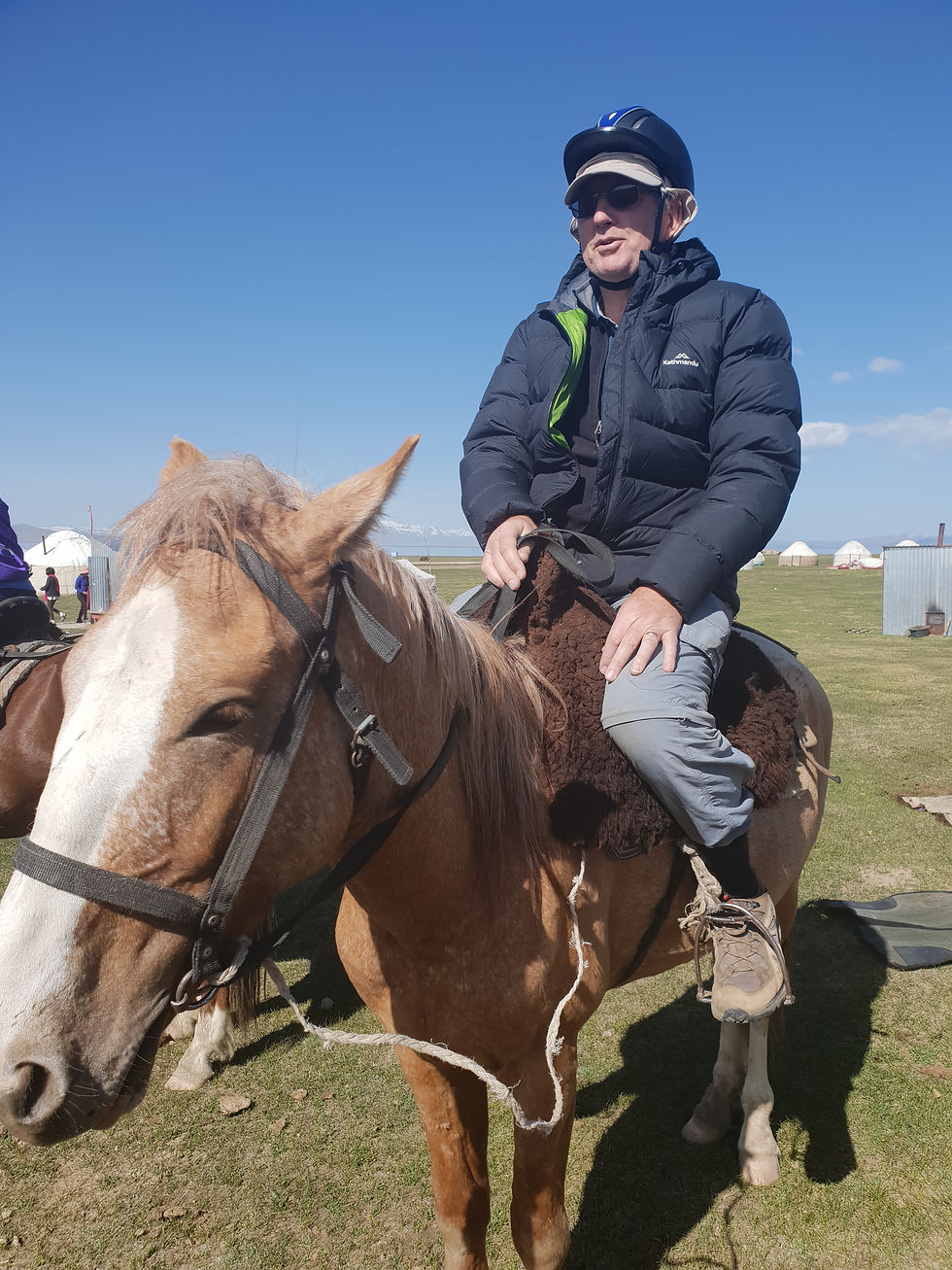Song Kol Lake (Part 2) - Day 21
- phaines2
- Jun 2, 2018
- 3 min read
Updated: Jun 11, 2020
I had a wonderful, warm, sleep. The duvets were so warm I found them too heavy. I pushed them away for 2 minutes last night, then realised my mistake and pulled them back over me. To top it off, I woke up in this magnificent valley. Breakfast was warm, tasty and very welcome. I’m beginning to realise the success of yurt culture rests on the shoulder of a ‘Grandma’ who keeps firm control over what goes on. This particular member of the species is a superb cook, has a great sense of humour, and I’ve no doubt has strict control over every other member of the family. Our group had a free day today – some chose to hike up mountains, others went for walks around the lake. Cavan and I opted for the horse riding option. We ended up in a group with four others. My horse was a lovely chestnut gelding, well-behaved, with a free-flowing walk. Because most of our riders were novices, we only walked, and even so, it was lovely. This is natural country for a horseman with beautiful rolling hills asking for a canter and nothing too difficult to negotiate. Cavan enjoyed himself as well, which was great as it must be 30 years since he last sat on a horse. The guide had brought his dog with him – a lovely cross bred animal who enjoyed himself roaming the hills with us. I wondered what he was chasing until the guide pointed out the marmots. These lovely little creatures would emerge from their burrows, stand upright like meerkats, and chirrup. The dog, not unnaturally, would then charge across the grassland to get them. Long before he represented any danger to them the marmots ducked down back into their burrows, and probably spent the day laughing at the hapless canine careering around above them. Stock handling here is interesting. Our horses were simply tied up, some six at a time, to a pole near the camp. This was fine for the most part, except that one of the animals was a territorially aggressive palomino who attacked the others around him, causing chaos. The guide and other herders gradually untangled the mess and sorted out the hierarchy. In Kyrgyzstan horses are regarded as any other stock, just like sheep and cattle, as a potential meat source. The best and most tractable are trained as riding horses, the rest turned into meat. I suspect a three-strike policy exists for those horses chosen to bear humans – behave, or else face a very short future. There are, of course, no fences to control stock movement. Horses are mostly hobbled. Cattle and sheep generally have a herdsman (or boy) to sit with them and steer them away from danger. Mares and their foals are tied together. This doesn’t necessarily mean the mare is cooperative when they want to catch her. This situation is resolved by catching the foal and tethering it to a long line. I had previously assumed long-lines required trees to stretch between, but of course, there are no trees here, so the long line is laid along a stretch of flat ground and pegged at each end. The foals are tied to this. Of course, their presence assures the compliance of their dams. I imagine this is how they are caught for milking by the herdsmen. I had wondered whether the lengths of rope would cause damage to foals, dams and other horses, but they seem to have become accustomed to the hazards, and just stand quietly if they get caught up. We came back to camp after our ride and I spent some hours catching up with my diary and Blog until my computer’s battery gave out and I had to return to writing my diary manually. I had a bath before the climbers and hikers came back. For 50 Ksoms (about 80 cents) you get the house of the bathhouse, a bucket of water, a dipper and 5 minutes of sauna heated heaven. Later we went for a walk. There was a raised platform some 200 metres from our camp with graffiti saying “Save Song Kol Lake”. I’m not sure what it means – whether it refers to water quality, plastic bag pollution, or tourism. It’s dated 2008, so who knows what it is trying to say. It is however, very clear that tourism is changing this pristine place. We walk too close to the animals and disturb them; we bring our rubbish; we bring change, pollution and a dilution of their own culture. It’s hard to know that while we enjoy this unique culture and environment we are also part of destroying something beautiful, just by our presence. Still, Kyrgyzstan is handling this threat better than most. In conjunction with a Swiss based initiative, they are practising something called Community Based Tourism (CBT) in which tourism and CBT have joined forces to provide responsible, community-based tourism.















.png)






Comments